高中英语语法-介词
高中英语语法介词归纳总结
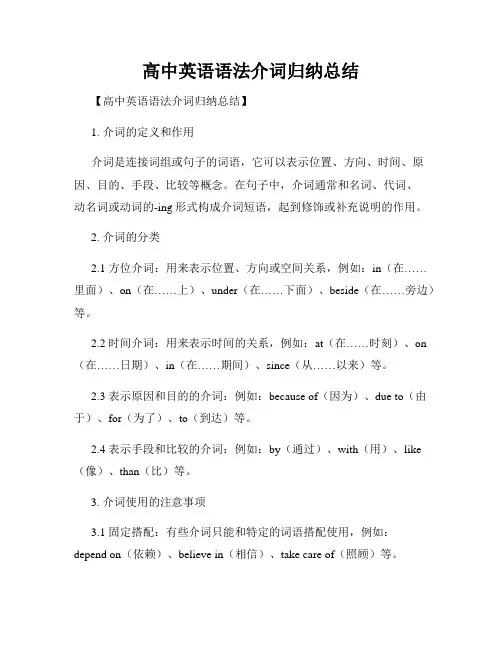
高中英语语法介词归纳总结【高中英语语法介词归纳总结】1. 介词的定义和作用介词是连接词组或句子的词语,它可以表示位置、方向、时间、原因、目的、手段、比较等概念。
在句子中,介词通常和名词、代词、动名词或动词的-ing形式构成介词短语,起到修饰或补充说明的作用。
2. 介词的分类2.1 方位介词:用来表示位置、方向或空间关系,例如:in(在……里面)、on(在……上)、under(在……下面)、beside(在……旁边)等。
2.2 时间介词:用来表示时间的关系,例如:at(在……时刻)、on (在……日期)、in(在……期间)、since(从……以来)等。
2.3 表示原因和目的的介词:例如:because of(因为)、due to(由于)、for(为了)、to(到达)等。
2.4 表示手段和比较的介词:例如:by(通过)、with(用)、like (像)、than(比)等。
3. 介词使用的注意事项3.1 固定搭配:有些介词只能和特定的词语搭配使用,例如:depend on(依赖)、believe in(相信)、take care of(照顾)等。
3.2 介词后的宾语:宾语通常是名词、代词或动名词,而且在形式上要与介词相匹配。
例如:for me(对我来说)、of them(他们的)、with singing(用唱歌的方式)。
3.3 介词短语位置:介词短语通常放在句子中适当的位置,以使句子结构更加清晰和流畅。
例如:The book on the table is mine.(桌子上的书是我的。
)4. 常用介词示例4.1 位置和方向介词:in(在……里面)、at(在……处)、on (在……上)、into(进入)、out of(离开)、off(离开)、up(上升)、down(下降)等。
4.2 时间介词:at(在……时刻)、on(在……日期)、in(在……期间)、since(从……以来)、before(在……之前)等。
高中英语语法 介词
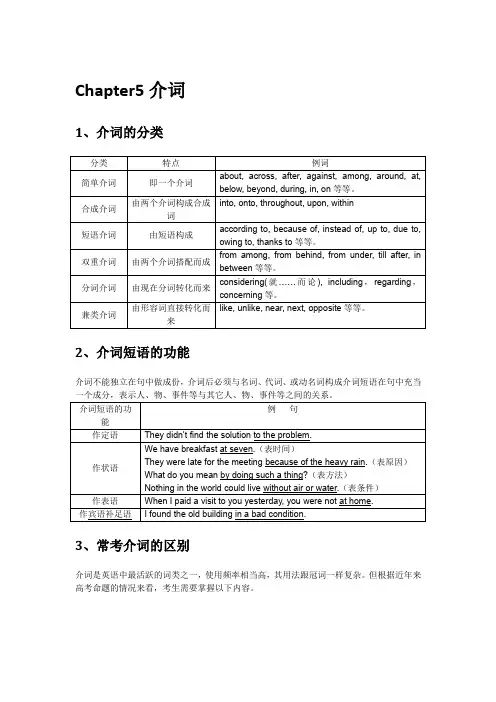
Chapter5介词1、介词的分类2、介词短语的功能介词不能独立在句中做成份,介词后必须与名词、代词、或动名词构成介词短语在句中充当3、常考介词的区别介词是英语中最活跃的词类之一,使用频率相当高,其用法跟冠词一样复杂。
但根据近年来高考命题的情况来看,考生需要掌握以下内容。
1、表示相同或相似概念的介词(短语)的区别①at 8 o’clock, at noon②in the 1990s, in January③on Monday, on a warm morning①We have not seen each otheron the①The lamp stands in the corner ofthe room.②I me t with him at the streetcorner.③He sat on the corner of the table.还有,besidesexceptbutexcept forin course of con struction正在兴建当中。
in(good)repair维修良好的in course of shipment.定的货正在运输途中。
in charge of负责in the charge of由……负责in possession of拥有in the possession of被……拥有on business办事/出差on holiday/vacation/leave 2、常见同一形容词与不同介词搭配时意义上的差别3、容易混淆的含有介词固定搭配的词组益处serve the people为人民服务(容易在serve后加for)enter the room进入房间(容易在enter后加into)follow me跟在我后面(容易在follow后加behind)marry sb.与某人结婚(容易在marry后加with)go abroad出国(容易在go后面加to)live upstairs住在楼上(容易在live后面加in)be caught in the rain被雨淋着(不用by)。
高中语法中的介词与介词短语
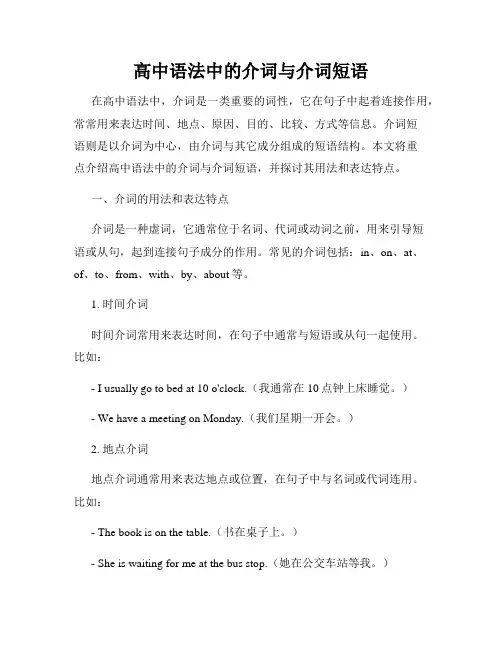
高中语法中的介词与介词短语在高中语法中,介词是一类重要的词性,它在句子中起着连接作用,常常用来表达时间、地点、原因、目的、比较、方式等信息。
介词短语则是以介词为中心,由介词与其它成分组成的短语结构。
本文将重点介绍高中语法中的介词与介词短语,并探讨其用法和表达特点。
一、介词的用法和表达特点介词是一种虚词,它通常位于名词、代词或动词之前,用来引导短语或从句,起到连接句子成分的作用。
常见的介词包括:in、on、at、of、to、from、with、by、about等。
1. 时间介词时间介词常用来表达时间,在句子中通常与短语或从句一起使用。
比如:- I usually go to bed at 10 o'clock.(我通常在10点钟上床睡觉。
)- We have a meeting on Monday.(我们星期一开会。
)2. 地点介词地点介词通常用来表达地点或位置,在句子中与名词或代词连用。
比如:- The book is on the table.(书在桌子上。
)- She is waiting for me at the bus stop.(她在公交车站等我。
)3. 原因介词原因介词常用来表示原因或理由,在句子中通常与短语或从句连用。
比如:- He is happy because of the good news.(他因为好消息而高兴。
)- I am tired from studying all day.(我因为整天学习而疲倦。
)4. 目的介词目的介词常用来表示目的或用途,在句子中通常与短语或从句连用。
比如:- I went to the supermarket to buy some food.(我去超市买点食物。
)- We practice speaking English for better communication.(我们练习说英语,为了更好地交流。
)5. 比较介词比较介词常用来表达比较关系,在句子中通常与短语或从句连用。
高中英语语法 介词
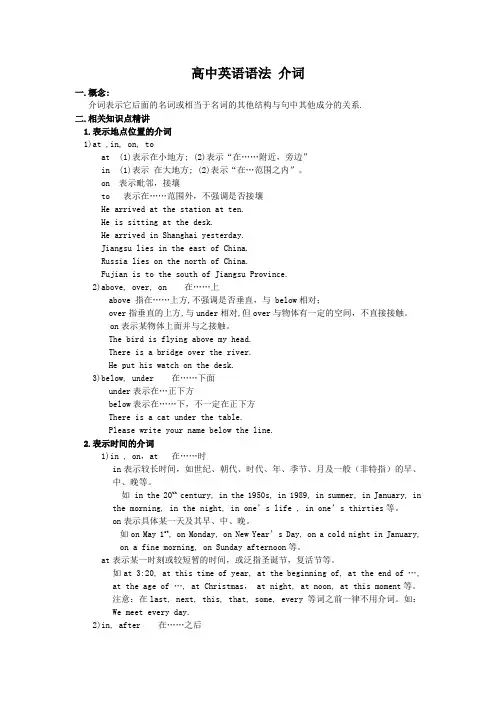
高中英语语法介词一.概念:介词表示它后面的名词或相当于名词的其他结构与句中其他成分的关系.二.相关知识点精讲1.表示地点位置的介词1)at ,in, on, toat (1)表示在小地方; (2)表示“在……附近,旁边”in (1)表示在大地方; (2)表示“在…范围之内”。
on 表示毗邻,接壤to 表示在……范围外,不强调是否接壤He arrived at the station at ten.He is sitting at the desk.He arrived in Shanghai yesterday.Jiangsu lies in the east of China.Russia lies on the north of China.Fujian is to the south of Jiangsu Province.2)above, over, on 在……上above 指在……上方,不强调是否垂直,与 below相对;over指垂直的上方,与under相对,但over与物体有一定的空间,不直接接触。
on表示某物体上面并与之接触。
The bird is flying above my head.There is a bridge over the river.He put his watch on the desk.3)below, under 在……下面under表示在…正下方below表示在……下,不一定在正下方There is a cat under the table.Please write your name below the line.2.表示时间的介词1)in , on,at 在……时in表示较长时间,如世纪、朝代、时代、年、季节、月及一般(非特指)的早、中、晚等。
如 in the 20th century, in the 1950s, in 1989, in summer, in January, in the morning, in the night, in one’s life , in one’s thirties等。
英语高中语法介词的用法和常用介词的区别
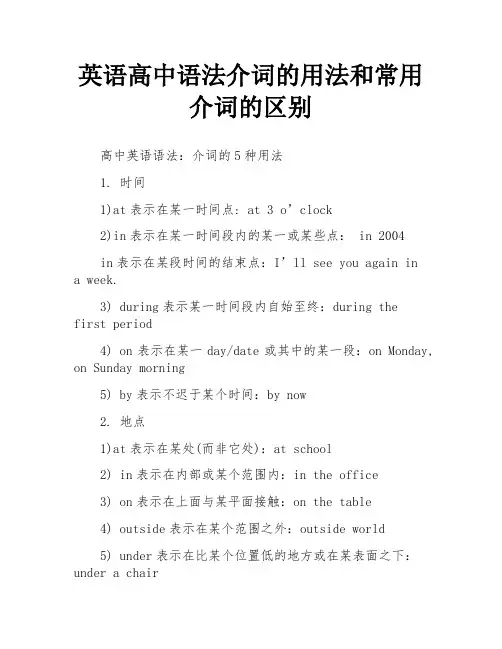
英语高中语法介词的用法和常用介词的区别高中英语语法:介词的5种用法1. 时间1)at表示在某一时间点: at 3 o’clock2)in表示在某一时间段内的某一或某些点: in 2004in表示在某段时间的结束点:I’ll see you again ina week.3) during表示某一时间段内自始至终:during thefirst period4) on表示在某一day/date或其中的某一段:on Monday, on Sunday morning5) by表示不迟于某个时间:by now2. 地点1)at表示在某处(而非它处):at school2) in表示在内部或某个范围内:in the office3) on表示在上面与某平面接触:on the table4) outside表示在某个范围之外:outside world5) under表示在比某个位置低的地方或在某表面之下:under a chair6) by表示靠近或接近:by the window3. 原因1)because of表示因为或以…为理由:because of my father2) for表示动作或活动的目的、目标或意图:for sale3) out of表示起源、来源或原因:out of duty4. 方式1)with表示以…方式:with skill2)in表示以某种方式: in French, in cash, in this way5. 方法1) by表示方法、手段: by the back road, by bus, by working hard2) on表示运送方式:on a train, on foot3) in表示途径或材料:in oils高中英语语法中常用介词的区别1、 at、in、on:如:常用词组有: at noon, at night表示时间的 at, in, on:at 表示片刻的时间,at 8 o’clock,at midnight, at the end of, at that time, at the beginning of, at the age of, at Christmas, at New Year 等。
高中英语语法填空介词有哪些
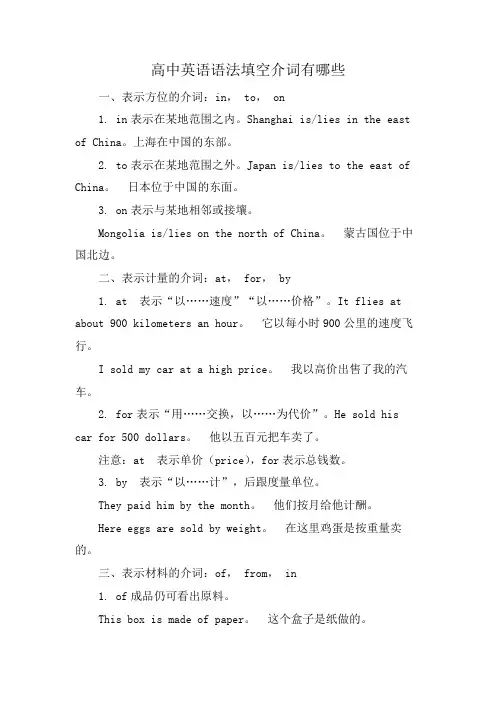
高中英语语法填空介词有哪些一、表示方位的介词:in, to, on1. in表示在某地范围之内。
Shanghai is/lies in the east of China。
上海在中国的东部。
2. to表示在某地范围之外。
Japan is/lies to the east of China。
日本位于中国的东面。
3. on表示与某地相邻或接壤。
Mongolia is/lies on the north of China。
蒙古国位于中国北边。
二、表示计量的介词:at, for, by1. at 表示“以……速度”“以……价格”。
It flies at about 900 kilometers an hour。
它以每小时900公里的速度飞行。
I sold my car at a high price。
我以高价出售了我的汽车。
2. for表示“用……交换,以……为代价”。
He sold his car for 500 dollars。
他以五百元把车卖了。
注意:at 表示单价(price),for表示总钱数。
3. by 表示“以……计”,后跟度量单位。
They paid him by the month。
他们按月给他计酬。
Here eggs are sold by weight。
在这里鸡蛋是按重量卖的。
三、表示材料的介词:of, from, in1. of成品仍可看出原料。
This box is made of paper。
这个盒子是纸做的。
2. from成品已看不出原料。
Wine is made from grapes。
葡萄酒是葡萄酿成的。
3. in表示用某种材料或语言。
Please fill in the form in pencil first。
请先用铅笔填写这个表格。
They talk in English。
他们用英语交谈。
四、表示工具或手段的介词:by, with, on1. by用某种方式,多用于交通。
高中英语 介词搭配
高中英语介词搭配介词是英语语法中重要的一部分,用于表示名词与动词、形容词、副词之间的关系。
在高中英语中,常见的介词有at,in,on,with,by,about,for,from 等。
下面我们将详细介绍这些介词的搭配用法。
1. 时间介词at表示在某一点时间或具体时间,如at seven o’clock,at noon;in表示在一个时间范围或一天中的某个时间段内,如in the morning,in the afternoon;on表示在某一天或具体某一天的上下午晚上,如on Monday,on the afternoon of July 4th;for表示持续一段时间,如for three days,for a week;since表示自从某个时间点开始,如since 2000。
2. 地点介词at表示在某个小地点或具体地点,如at the school gate;in表示在一个较大的地点范围或建筑物内,如in the classroom;on表示在某个物体上面或表面,如on the table;over表示在某个物体的正上方,如over the bridge;above 表示在某个物体的垂直上方,但不一定是正上方。
3. 方式介词by表示以某种交通工具或方式进行移动或完成某件事情,如by bus,by email;with表示使用某种工具或伴随某种情况完成某件事情,如with pen and paper;in表示以某种语言、方式或风格进行某件事情,如in English。
4. 原因介词because表示因为某个原因或理由,如because of his illness;due to表示由于某个原因或理由,但与because有所区别;owing to表示由于某个原因或理由,也与because有所区别;thanks to表示由于某个原因或理由而感激某人或某事。
5. 条件介词if表示在某个条件下实现某件事情,如if it rains;unless表示除非某个条件不成立或不满足,如unless you study hard;provided that表示在某个条件下实现某件事情,与if相似。
高中英语高考语法专题:介词
in
表示在某段较长的时间内(如 世纪、年代、月份等)或泛指
上午、下午、晚上等
in December“在十二月”; in the morning“在上午”
(2)表示时间的 in 和 after
in after
意义
表示“在……时间之内/ 之后”,所在的句中必
须表示将来。
表示“在……时间之 后”,通常“after+时 间段”与过去时连用, “after+时间点”与将
He rowed me over to the other side of the lake.
Cover her over with a blanket.(adv.)
(4)against有“违背,违逆;反对;对……不利;倚;靠;碰撞; 预防;衬托;与…相比”之意。
Vacations help us perform better at work, improve our sleep quality and cushion us against depression.假期能帮助我们在工作中表现得 更好,提高我们的睡眠质量和缓解忧愁。
My father will be back after 3 o’clock.
My father came back here after 3 days/ 3 days after/ 3 days later.
(2) 当时间名词前面被 this, that, last, next, some, every, one…等词限定时,通常不用任何介词。
(3) For + 时间段,用与表示一个动作或行为状态 持续了多久。(并不一定用完成时)
(4) 时间段+ ago/ before
through across over
高中英语语法复习---常用介词的用法
高中英语语法常用介词的用法早、午、晚要用in,at黎明、午夜、点与分。
年、月、年月、季节、周,阳光、灯、影、衣、冒in。
将来时态in...以后,小处at大处in。
有形with无形by,语言、单位、材料in。
特征、方面与方式,心情成语惯用in。
介词at和to表方向,攻击、位置、恶、善分。
日子、日期、年月日,星期加上早、午、晚,收音、农场、值日on,关于、基础、靠、著论。
着、罢、出售、偷、公、假,故意、支付、相反,准。
特定时日和"一……就",on后常接动名词。
年、月、日加早、午、晚,of之前on代in。
步行、驴、马、玩笑on,cab,carriage则用in。
at山脚、门口、在当前,速、温、日落、价、核心。
工具、和、同随with,具有、独立、就、原因。
就……来说宾译主,对、有、方状、表细分。
海、陆、空、车、偶、被by,单数、人类know to man。
this、that、tomorrow,yesterday,next、last、one。
接年、月、季、星期、周,介词省略已习惯。
over、under正上下,above、below则不然,若与数量词连用,混合使用亦无关。
'beyond超出、无、不能,against靠着,对与反。
besides,except分内外,among之内along沿。
同类比较except,加for异类记心间。
原状because of,、owing to、due to表语形容词under后接修、建中,of、from物、化分。
before、after表一点, ago、later表一段。
before能接完成时,ago过去极有限。
since以来during间,since时态多变换。
与之相比beside,除了last but one。
复不定for、找、价、原,对、给、段、去、为、作、赞。
快到、对、向towards,工、学、军、城、北、上、南。
but for否定用虚拟,复合介词待后言。
高中英语语法介词
高中英语语法介词介词是英语语法中非常重要的一部分,它们用来表示名词或代词与句子其他成分之间的关系。
下面我们将介绍一些常见的介词及其用法,并给出一些例子。
1. atat通常用于表示在一个时间点或地点。
例如:I will meet you at the airport. 我在机场和你见面。
They arrived at the station at 8 o'clock. 他们八点到达车站。
2. inin通常用于表示在一个较大的空间或时间范围内。
例如:I live in a small town. 我住在一个小城镇。
The concert will be held in the park. 音乐会将在公园举行。
3. onon通常用于表示在某个物体或表面上。
例如:Put the book on the table. 把书放在桌子上。
The cat is sitting on the mat. 猫正坐在垫子上。
4. underunder通常用于表示在某个物体或下方的位置。
例如:The table is under the window. 桌子在窗户下。
The cat is under the bed. 猫在床下。
5. nearnear通常用于表示在某个物体或地方附近的位置。
例如:The school is near the railway station. 学校在火车站附近。
They sat near the fire. 他们坐在火堆旁边。
6. behindbehind通常用于表示在某个物体或人的后面位置。
例如:The car is behind the tree. 车在树后面。
The cat is behind the sofa. 猫在沙发后面。
7. beforebefore通常用于表示在某个物体或人的前面位置。
例如:The bus stop is before the bridge. 公交车站桥前面。
- 1、下载文档前请自行甄别文档内容的完整性,平台不提供额外的编辑、内容补充、找答案等附加服务。
- 2、"仅部分预览"的文档,不可在线预览部分如存在完整性等问题,可反馈申请退款(可完整预览的文档不适用该条件!)。
- 3、如文档侵犯您的权益,请联系客服反馈,我们会尽快为您处理(人工客服工作时间:9:00-18:30)。
介词一.介词的定义和特征介词是一种用来表示词与词, 词与句之间的关系的词。
在句中不能单独作句字成分。
介词后面一般有名词代词或相当于名词的其他词类,短语或从句作它的宾语。
介词和它的宾语构成介词词组,在句中作主语, 状语,表语,补语或介词宾语。
例如:Most of the students went to the classroom.大部分学生去了教室。
We play basketball on the sports ground.我们在操场上打蓝球。
介词常与动词,形容词,名词一起构成固定搭配。
belong to 属于,rely on 依靠,talk to 同...谈话,be afraid of 害怕,be strict with对...严格...介词一般放在名词之前。
但它后面的介词宾语是疑问代词,疑问副词或者关系代词时,这些词提到了前面而只剩下介词在后了。
Where do you come from?你是哪儿人?Who are you talking to?你在跟谁谈话呢?What do you study for?你为了什么而学习?介词在英语词汇中所占比例很小,但它们的用法却非常灵活,复杂。
下列为常用介词及含义:about关于,附近,大约,周围,随身I have bought a book about Shakespearean.我买了一本有关莎士比亚的书。
There are about fifteen trees in the picture.图片里大约有十五棵树。
above在....上,高出,以上,超过,在...上游The plane is flying above the clouds.飞机在云上飞行。
I think the man is above sixty years old. 我想那人有六十多岁了。
across 横过,对面,交叉,在...的对面Can you swim across the river?你能游过河吗?We live across the street. 我们住在街的对面。
after在...后面,依照He went home after school.他放学后就回家了。
Read after me, please. 请跟我朗读。
against 撞到,靠着,反对,违背The car hit against the tree. 汽车撞了树。
He is standing against the wall. 他靠墙站着。
along沿着,顺着They are walking along the river. 他们沿着河行走。
among在...当中He is the tallest among them. 他是他们当中个子最高的。
around在...的周围,在...那一边They sat around the table talking the news.他们绕桌而坐谈论新闻。
There is a drugstore around the corner.拐角处有一家药店。
as 作为He doesn't like people treat him as a child. 他不喜欢人们把他当小孩子对待。
at在...时刻,在...点钟,在...岁时, 向,在...之中,按...速度,值(卖)...钱He always gets up at six in the morning. 他时常早上六点钟起床。
He shot at the bird but missed it. 他向鸟射击,但是没射中。
The car goes at eighty miles an hour. 汽车以每小时八十公里的速度行驶。
before在...的前面(位置),在...之前(时间)He took a picture before the car. 他在汽车前照了张照片。
He can't finish his work before supper. 晚饭前他完不成工作。
behind在...的后面(位置), 落后于,不如,迟于,晚于(时间)Are there any brooms behind the door. 门后有扫帚吗?All of us are behind him in mathematics. 我们数学都不如他。
below在...之下,低于...There are four lights below the ceiling. 天花板下面有四盏灯。
The murderer run away below the police's eyes. 杀人犯从警察眼皮底下跑了。
beside在...的旁边,在...之外,与...相比He found the body by the river. 他在河边发现了尸体。
Beside yours,my computer is too slow.与你的计算机速度相比,我的就慢多了。
besides除...之外We are all here besides Bowe. 除鲍外,我们也都来了。
between在...两者之间The relations between the two countries has improved since then.两国的关系从那以后得到了改善。
beyond 在...那边The shop you are looking for is beyond the street, you can't miss it.你要找的商店在街的那边,你不会找不到的。
but 除去He has nothing but money. 他除钱以外什么都没有。
by 被..., 在...的近旁, 在...之前, 不迟于, 以...为手段。
The classroom was cleaned by the students. 教室由学生们打扫干净了。
Miss Lucy came to China by air. 露西小姐是乘飞机来中国的。
down 沿着...望下She walked down the street. 她沿着街道走。
during 在...期间,在...时候。
During the holiday, we went to the south.我们假期去了南方。
except 除...之外He knows nothing except English.他除英语以外什么都不知道。
for 为..., 因为..., 至于...He works for this company. 他为这家公司工作。
She came back to the classroom for she had left her books in the classroom.她返回到教室是因为把书留在了那里。
from 从..., 来自..., 因为...Where are you from? 你是哪里人?He died from an accident. 他死于一场事故。
in 在..., 在...之内,从事于..., 按照..., 穿着...He was born in 1992. 他生于1992年。
I could finish the program in two weeks. 我可以用两周时间完成这个项目。
He spend less time in reading. 他读书时间很少。
The man in black jacket is our teacher. 穿黑夹克的那个人是我们的老师。
like 象...,如同...The twins are like their father. 双胞胎象他们的父亲。
near 靠近....There are some flowers near the house. 房子附近有一些花。
of ...的,属于...This is a map of China. 这是一张中国地图。
off 离开...,在...之外The young man got off the train quickly. 那个年青人很快下了火车。
I live in a village a little way off the main road. 我住在离大路不远的一个村庄里。
on 在...之上My book is on the table. 我的书在桌子上。
out of从...出来,在...之外The dog run out of the house. 狗从房子里跑出来。
outside ... 外边They are waiting outside the gate. 他们在门外等着。
over 在...之上,遍于...之上,越过...There is a light over the desk. 桌子上方有盏灯。
He is over sixty years old. 他有六十多岁。
past 越过...,过...,超越...The students walked past the post office.学生们走过了邮局。
It is ten past two.现在是两点十分。
round 围着...,绕过...,在...周围We sat round the table.我们围着桌子坐下。
The earth goes round the sun.地球绕着太阳转。
since 自... 以后,自...以来He has made great progress in English since he came into the college.从他来到大学后,他的英语有了很大进步。
through 经过...,穿过...They went through the forest.他们穿过了森林。
throughout 遍及...,在各处The police searched for the criminal throughout the mountain.警察搜山寻找犯人。
till 直到...,在...以前He didn't come back till eleven o'clock.他直到十一点钟才回来。
We'll be home till six.六点以前我们都会在家。
to 到...,向...,趋于How long is it from here to the station?从这儿到车站有多远?under 在...之下,低于There are some footballs under the bed.床底下有几颗足球。
These students are under seventeen years old. 这些学生们不到十七岁。
